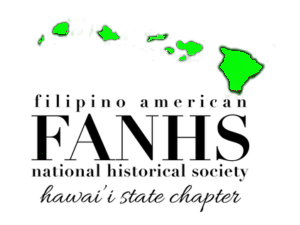A Partnership in Action Gathering, Preserving, and Sharing our History Hawaii’s Filipino American History and History-in-the-Making
The interconnecting relationship among social groups in Hawaii is a reflection of how individuals belong to several groups and therefore tend to cultivate, nurture, and maintain enthusiastic inter-group support. The following four groups make up an example of this form of a relationship.
The FANHS – Hawai’i State Chapter (FANHS-HSC) – Mission is “to promote understanding, education, enlightenment, appreciation, and enrichment through the identification, gathering, preservation, and dissemination of the history and culture of Filipino Americans in the United States.” Hawai’i State Chapter (HSC) enjoys meeting its mission by working with other like-minded groups and individuals, such as the following dedicated groups.
The Hawai’i Plantation Village (HPV) – “Functions to preserve a living museum of Hawaii’s multicultural Plantation History.”
The Filipino Women’s League (FWL) – “Encourages education and a better understanding and appreciation of our Filipino (American History… and Culture…”
The Chaminade University’s Filipino Club (CUFC) – Promoting student knowledge and involvement in preserving Filipino American History in Hawaii.
The Filipino American National Historical Society-Hawaii State Chapter (FANHS-HSC) is currently in the process of preparing to host FANHS 18th Biennial FANHS 2020 Conference. In addition to the following groups and other community groups on Oahu, HSC is pursuing the inclusion of other community groups on our family of neighboring islands.
The Hawai’i Plantation Village (HPV) “is an outdoor museum telling the story of life on Hawaii’s sugar plantations (circa 1850-1950). The Village includes restored buildings and replicas of planning structures, including houses of various ethnic groups and community buildings such as the plantation store, infirmary, bathhouses, and manager’s office” (HPV information). Earlier, the FWL “adopted” the Filipino family house and the Filipino single men’s dormitory in the HPV for a short time to provide community service. FWL immediately began its community service by providing both houses with fresh cleaning before offering HPV more authentic period pieces for these houses.
The Filipino Women’s League (FWL) In 1970, Dr. Manayan, concerned about Hawaii’s Filipino plantation workers found isolated and living in poor health in dilapidated quarters, organized several chapters to “encourage better understanding and appreciation of our Filipino heritage and culture, to provide community service and outreach, and to award scholarships to high school graduates seeking higher education within the State”. Many of the FWL members are the daughters of Filipino Plantation Laborers. These women were born and raised during the plantation era and grew up in plantation camps, villages, and communities. The FWL has donated generously through many community service projects over the past decades.
The Chaminade University’s Filipino Club (CUFC), like so many other student clubs in Hawaii’s schools, includes descendants of the islands’ Filipino Plantation Workers, descendants of Filipinos who arrived in Hawaii since the plantation era. The friendships and work ethics these students share and demonstrate reflect the gathering and associations of all the people of Hawaii.
In 2016, FANHS-HSC received Board approval from the Hawai’i Plantation Village (HPV) located in Waipahu, Oahu, to work on a project to support HPV. FANHS-HSC encouraged and supported the Filipino Women’s League (FWL) of Hawai’i, located in Pearl City, Oahu, with some of its ongoing community service interests and efforts. FWL adopted the Filipino family house and the Filipino single men’s dormitory at the HPV. FWL immediately began its community service by providing both houses with fresh cleaning before offering HPV more authentic period pieces for these houses. FANHS-HSC, impressed by Chaminade University’s Filipino Club and its desire to do community service, also proposed to HPV and FWL that students be encouraged and supported to help care for the yard and gardens for these two houses. FWL agreed to work with the students and help with the maintenance of the Filipino gardens. And so, the “…understanding, education, enlightenment, appreciation, and enrichment” of Hawaii’s Filipino American History continues in Hawai’i…
